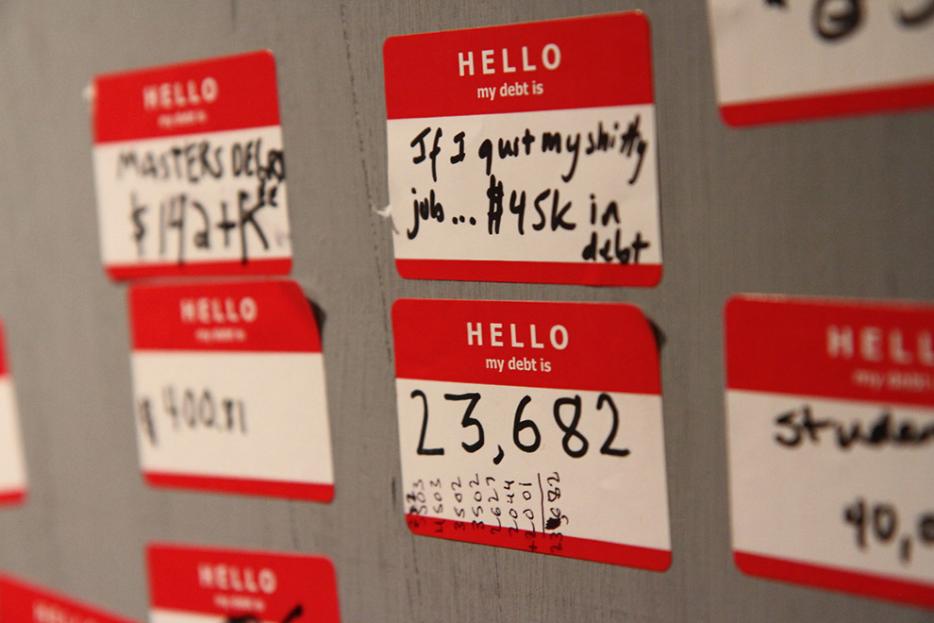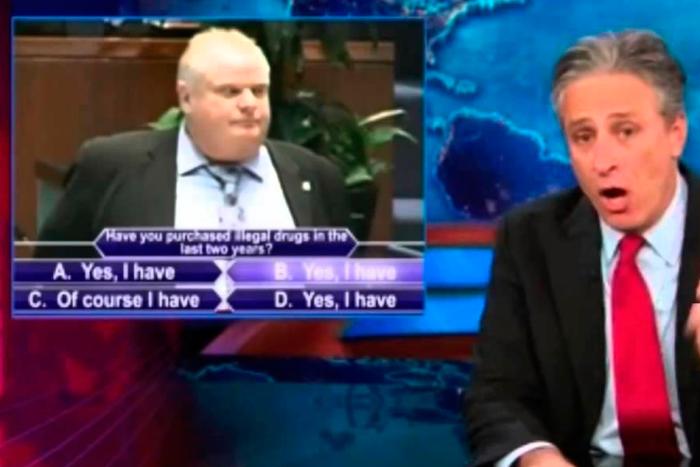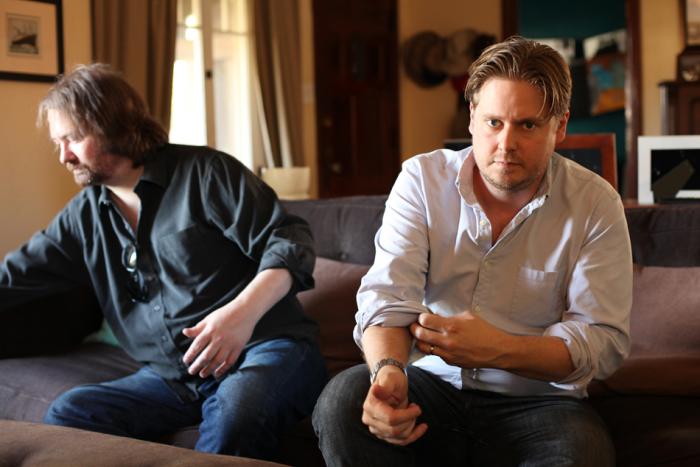For the last year I have been working on a political campaign called The Rolling Jubilee that is simple and complex and kind of magical: we buy people’s debts and abolish them. Few Americans know that their unpaid bills—healthcare, credit card, and other kinds of consumer accounts—are often sold for pennies on the dollar on a shady, speculative, and alarmingly unregulated market. The Rolling Jubilee participates in this market, but instead of trying to collect the full amount of the debts we buy, we make them disappear. This week we announced that we have abolished $13.5 million worth of medical debt owed by 2,693 people, and they owe us nothing in return.
Many of the things I work on don’t make it so far; in this sense at least, The Rolling Jubilee, organized by Strike Debt, an Occupy Wall Street offshoot, has been a resounding success. It went from concept to reality, and that’s something. I have a drawer where I keep records of many projects that, for some reason or another, hit a wall—a container of failures. There are proposals for films, notes for unwritten manifestos, and blueprints of political crusades my comrades and I don’t have the time or money to pursue. But there’s one project that’s a bigger flop than all the others: the manuscript of a nonfiction book that I researched and wrote, on and off, for five years. The book is about the conflicted political legacy of the sixties for people who grew up in the decade’s aftermath, and for many years I felt terrible that I couldn’t pull it together.
Again and again I returned to the theme of failure, wondering how it was defined. If a commune lasted a few years or even a decade, was it a failure or a short-lived success? If the experience of planning an anti-climatic demonstration motivated someone to develop new effective organizing tactics, should the demonstration be counted as a defeat or a victory? How, I wondered, do we define what’s futile and what’s worthwhile, what has an impact and what doesn’t?
As a child of the counterculture (third generation—my grandmother, who lived in Toronto at the time, was on the hippie vanguard), I was interested in the way my experience defied the mainstream expectation that I would rebel against my parents and become a Republican or Conservative, like the kid in the sitcom I never saw because we didn’t watch television. I was also interested in how the sixties cast a shadow over all subsequent political activities, serving as both inhibitor and inspiration. The decade was simultaneously extolled as a pinnacle of protest (one we in the present could never live up to) and dismissed as a risible relic, sometimes in the same breath. I was fascinated by our society’s schizophrenic relationship to the time and all the currents it contained: the history of the civil rights, feminist, and antiwar movements, the communes and alternative schools that were started by the thousands, and the rightwing backlash triggered by all this. Then there were the veterans of the period I interviewed, who could be both sanctimonious and contrite, proud and full of regret.
I wasn’t trying to present the correct view of one of the most written about and debated decades—that would have been folly. Rather, I was interested in ambiguity and how the meaning of events could change over time. Again and again I returned to the theme of failure, wondering how it was defined. If a commune lasted a few years or even a decade, was it a failure or a short-lived success? If the experience of planning an anti-climactic demonstration motivated someone to develop new effective organizing tactics, should the demonstration be counted as a defeat or a victory? How, I wondered, do we define what’s futile and what’s worthwhile, what has an impact and what doesn’t?
*
When Occupy Wall Street started in September 2011 and I found myself in Zuccotti Park day after day, unable to resist the bizarre and growing gathering of the discontented, my friends would ask me if I was making a documentary about it. I would explain that I didn’t want to watch things unfold at a remove, that somehow the idea of making a film about Occupy’s rise and decline made me sad (I knew the decline would inevitably come). Instead, I felt an obligation to try to push the movement along and extend its reach, to paddle against the current with everyone else, not just stand on the sidelines holding a camera watching others sweat.
It wasn’t until well after the occupation ended though that I found a way in—crossing the line from supportive observer to obsessive organizer by joining forces with Strike Debt. To talk to people during the first few weeks of Occupy Wall Street was to talk about student loans that couldn’t be repaid, medical bills that were piling up, houses that had been reclaimed by bailed out banks, and insolvent communities forced to endure austerity measures. Debt bridges the personal and political, binding individuals to a broader set of economic circumstances, and as such presents a powerful opportunity to unite otherwise divided populations. Maybe debt was something we could work with?
When I was writing my book about the sixties I speculated that student debt was one of the reasons why so few young people were in the streets protesting the wars in Iraq and Afghanistan; they were too busy trying to make money for their monthly payments. That’s the trap I was in at the time. I saw debt was an effective means of social control (indeed, the roots of student debt can be traced to Ronald Reagan’s grudge against student protesters when he was California’s governor in the sixties). The emergence of Occupy was a welcome sign that the control mechanism was breaking down. Rising debt loads and the slumping economy were combining to cause young people to doubt they would ever be able to pay off the unfair, or odious, debts around their necks. Refusing those debts and demanding a new arrangement was beginning to seem like a legitimate option.
*
When The Rolling Jubilee launched on November 15 last year our ambitions were relatively modest. We aimed to raise $50,000 through a telethon hosted at a venue in lower Manhattan, and livestreamed to anyone who cared to watch. With that money we estimated we could buy and abolish $1 million of medical debt, while highlighting the injustice of a system that drives millions of sick people and their families into bankruptcy, and in which misfortune can be bought and sold (those who are in the business of procuring medical debt are in the business of profiting from misery).
The telethon planning committee—me, filmmaker Laura Hanna, music critic Michael Azerrad, and master of ceremonies David Rees—roped in sympathetic friends to provide entertainment, mixing speed lectures on inequality, stand up comedy, and performances by TV On the Radio, Sonic Youth’s Lee Ranaldo, and an all-lady mariachi band. It was an edifying and unpredictable night, but the telethon was almost redundant. A Tumblr post by an actor who had appeared on Star Trek: The Next Generation help make the campaign go viral and we exceeded our fundraising goal before the first act even took to the stage.
Lessons in strategic tenacity, in failing again and failing better, aren’t on any curriculum I’ve ever seen, though they should be. Political organizing is a skill that precious few institutions exist to pass on. Instead we leave each new generation to reinvent the wheel given the limited tools and historical knowledge they have at hand, and roll our eyes when it flies out from under them.
By the end of the night we had raised almost $600,000. In the process, a small number of us had committed ourselves to being full-time volunteer debt abolishers, perhaps the first of our kind in the history of the world. Endless meetings with legal experts, accounting professionals, and moles in the debt industry would soon follow. We had to master a field that was alien to us and that we were explicitly hostile to. The Rolling Jubilee was a risky undertaking for many reasons, and were it not for the tireless effort of the core team—the countless conference calls, the mornings spent poring over documents and contracts—it could have been a disaster. That we have done what we said we were going to do, honouring our donors and spending their money as wisely as we could, is a tremendous relief. That we have already heard back from some of the people whose debts have been abolished makes all the anxiety and exertion seem worthwhile. The debtors got letters in the mail a couple weeks ago, and responded with gratitude, shock, and disbelief. Some have a hard time believing that The Rolling Jubilee is not a scam, since it sounds too good to be true.
*
Participating in Occupy in any capacity, even being part of The Rolling Jubilee, has never been easy for me. In many ways it goes against the fundamental currents of my personality. I, for one, would rather read about history than make it, since real political work involves continuous interpersonal negotiations, meetings that never end, and receiving and responding to hundreds of emails a day. It’s reactive, not contemplative, and I prefer life with more of the latter. There’s a myth that activism is the natural domain of a certain subset of human beings that thrive in group discussions, protest planning sessions, and vegan potlucks. I’m just “not that type”—people who otherwise identify as leftists demur, when asked why they stick to the realm of theory as opposed to action. It’s a myth that lets us off the hook, perpetuating the old idea that it’s someone else’s calling to actually make change, though it’s a mantle that falls to particular groups over time: the proletariat, the poor, the youth, the students, the activist types, the not-us.
Sometimes I still think I’m “not that type” and want to quit and spend my time on other things. Let the born activists go out and plan protests; I want to stay in and read, analyze, debate, and pass judgment. That’s where I’m most comfortable. It’s a division of labor appeals to me, even if I oppose it philosophically. For one, it’s distorting. To outsiders, it’s easy to prescribe methods and measures to activists: unions, for example, should appeal to people beyond their membership and build common cause; environmentalists should lobby the government to invest in green energy; Occupy should have pushed for full employment; and so on. But these maps are only truly legible from afar: as soon as you zoom in and try to figure out how to actually get from point A to point B things get murky, the path forward covered in brush, and the horizon impossible to discern. The map one can draw at a distance lacks the detail needed to actually follow it on the ground, which doesn’t mean it’s not worth drawing. What it means is that we need more people who can switch back and forth between the macro and micro view, who understand the challenges and obstacles that emerge when you are in the thick of things.
To do this means becoming more acquainted with failure, something most of us would rather avoid. Like those who prefer punditry to campaigning, I like to be right. And messy political work doesn’t always allow for the certainty that opining does. Even if you’re the self-righteous sort (a tendency I confess to sharing with many activists) wanting to be right is something different, a vice common to the intellectuals and professional prattlers. If you care about being smart and having an analysis that trumps the others, it’s safer to be cynical about attempts to create social change, and to list all the logical reasons such efforts will likely fail—to always bet on the status quo maintaining its grip. Activism requires a kind of willed hopefulness, a readiness to bash your head against a wall so that it may crumble or crack, even if you know all the arguments that what you’re doing is probably doomed.
*
The Rolling Jubilee can seem too good to be true, but at the same time it is not nearly enough. (This is something our critics on the left never tire of reminding us.) It will not, on its own, end the debt cycle nor overthrow capitalism. As I wrote last year with one of my collaborators, Andrew Ross, The Rolling Jubilee was always meant as a spark, not a solution. We know we can’t abolish all the medical debt, let alone all the other kinds of debt, held by US citizens. The total amount of medical debt we have abolished to date—$14.7 million—is a drop in the ocean, sloshing around an America in arrears. And we know that even if we could make all this debt dissolve overnight, the underlying dynamic that puts people into such a state would remain unchanged, and that they would just start moving steadily back into the red.
Given this, those of us who spearheaded The Rolling Jubilee never saw the campaign as an end in itself. Instead we hoped it might serve as a stepping-stone to a debt resistance movement, to concerted collective action against economic exploitation, peonage, and endless tribute to the creditor class. What we ultimately need is a jubilee—a cancellation of debts—coupled with a profound economic transformation that addresses the underlying causes and conditions. In the United States things like universal healthcare, free public education, truly livable wages so people can stop going into debt to pay for basic needs, and new forms of socially productive credit that don’t tie people in chains of compound interest, would go a long way toward this end.
*
I just drew a map from on high, one that advises we go from A to B without suggesting any specific routes that will help us make the journey. A jubilee and an economic transformation sound divine, but it’s a big demand against which formidable and amply funded forces are aligned. How will we find a way forward? Where can you go to learn how power works and how to organize against it? Lessons in strategic tenacity, in failing again and failing better, aren’t on any curriculum I’ve ever seen, though they should be. Political organizing is a skill that precious few institutions exist to pass on. Instead we leave each new generation to reinvent the wheel given the limited tools and historical knowledge they have at hand, and roll our eyes when it flies out from under them.
My book on the sixties was a failure, but in retrospect a fruitful one. As a result of working on it, I approached Occupy with more patience than I might have otherwise, well aware that bygone social movements are bathed in a nostalgic light that obscures all the doubt, confusion, and sensations of impotence that attended them. I was more aware of the fact that seeds planted often take many years to grow, that they can be scattered to unexpected places and lay dormant for long spells only to suddenly sprout and flourish. I saw flaws too, like the era’s dependence on charismatic leaders and the destructive generational divide, which sabotaged solidarity across the ages by insisting young people were the true agents of social change when there’s no way they can fix everything alone.
The fact is, when it comes to changing the world, no one really knows what will work, though some have better instincts than others and are less afraid to follow them. For now, my comrades and I have some ideas about what we might do next. Among other things, Strike Debt is looking into pushing for stronger regulations of debt brokers, plotting campaigns against Sallie Mae and other predatory lenders, assisting and building on eminent domain fights in California, coordinating citizen debt audits as they have in France, and, most excitingly, hatching plans to build something like a debtors union, an organization that could aggregate and harness our collective economic power. The Rolling Jubilee will continue to roll on, taking new forms and offering mutual aid, education, and encouragement over the coming months. No doubt, some of these schemes may find their final resting place in a drawer of failures, but I’ve come to the conclusion that that isn’t necessarily such a terrible fate.






